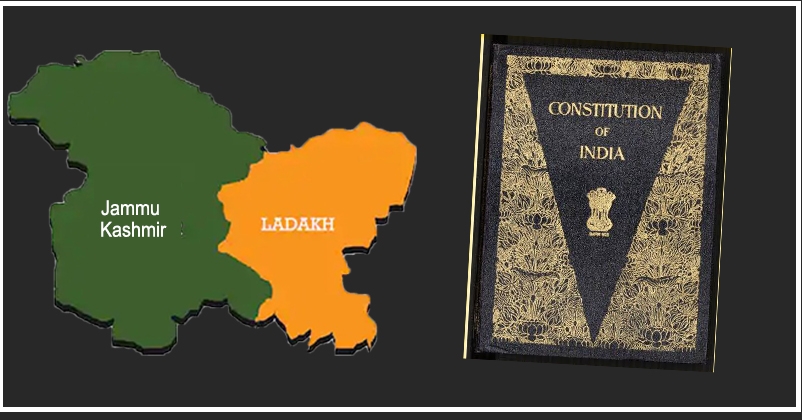31 October’19- Renaissance of Jammu and Kashmir, here is list of TOP 24 central laws made applicable to Jammu Kashmir & Ladakh
31 Oct 2019 12:57:40

The Jammu and Kashmir Reorganisation Act was passed in August 2019 and will come into effect from 31 October; 2019.This will make the Central laws applicable to the UT of Jammu and Kashmir. This will bring equality among people and also it will make the population aware and enjoy the rights given by the constitution of India. Here are some major acts which will now be applicable in the UT -:
Right to Education Act, 2009-This act provides free basic education to children up to 14 years of age. This aims to provide basic education and literacy to children and it is also a fundamental right in the Indian constitution.
The Prohibition of Child Marriage Act,2007 - Child marriage has been an issue in India for a long time, because of its root in traditional, cultural and religious protection it has been hard battle to fight. This act sets the minimum age for marriage, and marriage of minors would be an offense.
The Right to Information Act, 2005 - any citizen of India may request information from a "public authority" (a body of Government or "instrumentality of State") which is required to reply expeditiously or within thirty days. It gives liberty to people to know information.
The Aadhar (Targeted Delivery of Financial and other subsidies, benefits and services)Act,2016- It aims to provide legal backing to the Aadhaar unique identification number project. It makes easy for govt. to provide benefits and subsidies and also increases transparency.
The Dowry Prohibition Act, 1961- It separates dowry and marriage presents and makes giving and accepting dowry an offense. It will reduce atrocities on females.
The Juvenile Justice (Care & Protection of Children)Act,2015- It allows minors in the age group of 16-18 to be tried as adults if they commit heinous crimes. The crime will be examined by the Juvenile Justice Board to ascertain if the crime was committed as a 'child' or an 'adult'.
The Anand Marriage Act, 1951-It allows Sikhs to register their marriages under it and not under the Hindu marriage act.
The Indecent Representation of Women (Prohibition)Act,1986- It prohibits indecent representation of women through advertisement or in publications, writings, paintings, figures or in any other manner. It will empower females in the UT
The Protection of Women from Domestic Violence Act, 2005-The Act makes domestic violence against females an offense and is not only restricted to physical violence.
The Protection of Children from Sexual Offences Act,2012-This act protects children and is a much needed law in the territory.
The Muslim Women (Protection of Rights on Divorce)Act,1986-It gives some rights to divorced Muslim Women for their betterment.
The Muslim Personal Law (Shariet) Application Act,1937-This law deals with marriage, succession, inheritance and charities among Muslims.
The Family Courts Act,1984-This law helps in speedy settlement of disputes of marriage and family affairs.
The Hindu Succession Act, 1956- The Act lays down a uniform and comprehensive system of inheritance and succession into one Act. The Hindu woman's limited estate is abolished by the Act. Any property possessed by a Hindu female is to be held by her absolute property and she is given full power to deal with it and dispose it of by will as she likes.
The Prevention of Damage to Public Property Act,1984- This act specifically lays provisions for preventing damage to public property and makes damaging it an offense
The Commission for Protection of Child’s Rights Act, 2006- It ensures that all Laws, Policies, Programmes, and Administrative Mechanisms are in consonance with the Child Rights perspective as enshrined in the Constitution of India.
The Maintenance and Welfare of Parents and Senior Citizens Act, 2007-This act makes it a legal obligation for children and heirs to provide maintenance to senior citizens and parents, by monthly allowance. This Act also provides simple, speedy and inexpensive mechanism for the protection of life and property of older people
The National Commission for Minorities Act, 1992-This ensures and safeguards the rights of particular minority communities.
The Hindu Marriage Act, 1955- This law regulates the system of marriage, separation and divorce in majorly Hindus and some other communities
The Indian Penal Code,1860-It is a comprehensive code intended to cover all substantive aspects of criminal law.It aims to provide a general penal code for India.
The National Commission for Minority Educational Institutions Act, 2005- Its objective is to protect and safeguard the educational institutions which are established by the religious minorities in India. This also ensures rights of religious minorities to establish and administer educational institutions of their choice.
The Code of Criminal Procedure, 1973-It provides the machinery for the investigation of crime, apprehension of suspected criminals, collection of evidence, determination of guilt or innocence of the accused person and the determination of punishment of the guilty. Additionally, it also deals with public nuisance, prevention of offences and maintenance of wife, child and parents.
The Code of Civil Procedure, 1908-It ensures speedy disposal of civil cases governed under the act.
The Consumer Protection Act, 1986-It works for the establishment of consumer councils and other authorities for the settlement of consumer's grievances and for matters connected there with it.
The Contempt of Courts Act, 1971-It makes disrespecting or not obeying judiciary’s order or judgement a crime.